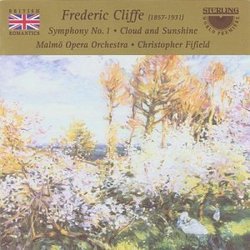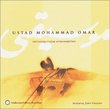| All Artists: Frederic Cliffe, Christopher Fifield, Malmö Opera Orchestra Title: Frederic Cliffe: Symphony No. 1; Cloud and Sunshine Members Wishing: 0 Total Copies: 0 Label: Sterling [Qualiton] Release Date: 11/25/2003 Album Type: Import Genre: Classical Style: Symphonies Number of Discs: 1 SwapaCD Credits: 1 UPCs: 675754682927, 7393338105527 |
Search - Frederic Cliffe, Christopher Fifield, Malmö Opera Orchestra :: Frederic Cliffe: Symphony No. 1; Cloud and Sunshine
 | Frederic Cliffe, Christopher Fifield, Malmö Opera Orchestra Frederic Cliffe: Symphony No. 1; Cloud and Sunshine Genre: Classical
|
Larger Image |
CD DetailsSimilar CDs
|
CD ReviewsAn intriguing album in more ways than one. David A. Hollingsworth | Washington, DC USA | 07/30/2004 (5 out of 5 stars) "Truth to tell, I cannot remember any album that generates quite a controversy as this one. The music is skillfully written almost to perfection, but it is Christopher Fifield's booklet essay that is raising eyebrows. The controversy? Stanford's prevention of future performances of Cliffe's First Symphony at the Leeds Festival, which, presumably at least, damaged his reputation. As Fifield points out, the Musical Times, commenting on the Symphony's highly successful 1889 premiere at Leeds, deemed the work as "one of the most remarkable works in its class produced in recent years." This, as Fifield argues, generated jealousy of Stanford, whose infamous Third Symphony "Irish" was premiere just two years previous. Yet, the comment of the Musical Times may not have in fact attacked Stanford, whether directly or even indirectly. By stating that Cliffe's aforementioned work is one of the most remarkable works in its genre produced in recent years, the Times may well be inclusive enough to imply that Stanford's work was also among the top of the heap. Whether Stanford overreacted or Fifield missed something isn't quite easy to tell, but a reader of Gramophone Magazine, in my view, had truly shed light on this controversy that put matters in their proper context. In the August edition of the Magazine, John Covall reminded us that not only Sir Arthur Sullivan was director of the Leeds Festival at the 1889 & 1892 premieres of both his First & Second Symphony, Stanford only became its director in 1901 (the post he held for the next nine years). But what made Covall's argument even more powerful and compelling is his assertion that Stanford programmed a good deal of new British music especially of Vaughan-Williams and Elgar and was in fact Cliffe's colleague at the Royal Academy of Music. Little wonders then why Vaughan-Williams defended Stanford for much of his career at the time when his teacher's music began to fade inexplicably in popularity and importance. As for the music, this is one of a number of examples of why many first symphonies comes off extremely well as this work does here. Just listen to the first symphonies of Bruckner, Brahms, Draeseke, Glazunov, Kalinnikov, Rachmaninov, Dohnanyi, et al. and you'll see what I mean. Bearing opus one, Cliffe's First Symphony is astonishingly assuring in its communication, orchestration, and form. In spirit, in style, and in structure, it's the work that reminds me of Draeseke's own First Symphony op. 12 (1872), with the first movement almost as alluring that its German counterpart. The strong piercing opening theme (that recurs throughout with some redundancy) gives way to the secondary theme that has a certain grace, though a tad too plain to hold firm interest. But the scherzo is simply brilliant, as that of Draeseke's, with the middle section @2'16" that has real nobility and dignified charm. And while Draeseke's scherzo evokes Berlioz in a very idiomatic fashion, Cliffe's looks somewhat upon Elgar. Curiously enough though, the scherzo also sings with an Eastern European accent that Dohnanyi's Waltz from 'The Veil of Pierrette' comes readily to mind. But should I take a movement as the highpoint of Cliffe's mastery of expressionism and form, the slow movement shall do just nicely enough. It's a highly poised yet an imaginative movement, lyrical in its own way but with the orchestration that would do Wagner proud (and there's a certain majesty in its rhetoric that Wagner or even Zemlinsky would find captivating). The climax is quite spellbinding and the passionate apotheosis towards the end does not disgrace the overall design and appeal of the piece. And where finales of first major music essays caused problems with a number of composers, the finale here is tightly argued, with its ideas remaining as fresh and vital as they are here. It's therefore an amazement that Cliffe remained such a fledgling of a composer as he was. His symphonic picture "Cloud and Sunshine" (1890), with some sparkling and colorful woodwind writings, and some heroic overtones that would not disgrace Dvorak, add some attractive attributes to his overall promising musical art. Performances and recordings are perfectly ideal here, though disc timing perhaps could've been more generous. Nevertheless, the Malmo Opera Orchestra is excellent throughout and Fifield proves to be a true advocate despite the controversy surrounding his otherwise intriguing, well-detailed booklet essay. This album, as that featuring Draeseke's Symphony and his Piano Concerto, should make a very rewarding listening endeavor even during the dampest of days." Very good on all counts - A real find K.I. Drossopoulos | 03/17/2007 (4 out of 5 stars) "I mostly agree with Mr. Hollingsworth's review, but for one point. No comparison of this with Draeseke's first symphony. Cliffe's is much better than that, a prime example of those rare gems of the second rank, which have lain inexplicably dormant till now (Erno Dohnanyi's beautiful violin concerto being another - try the version on CPO to see what I mean). Excellent music and playing and a very good recording indeed. Why then only four stars? Well, Cliffe is very good, but five stars is reserved for the giants."
|

 Track Listings (5) - Disc #1
Track Listings (5) - Disc #1
